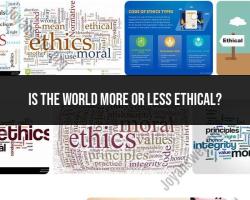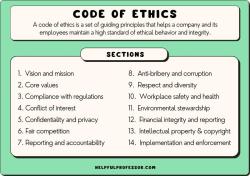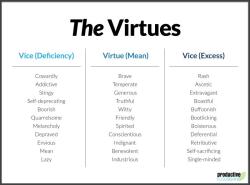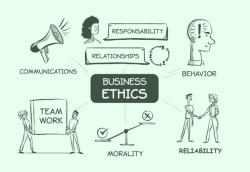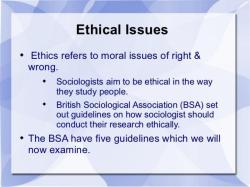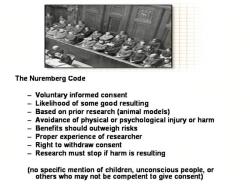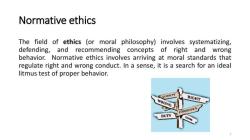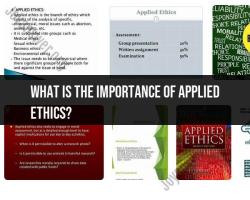How do ethics make you a better person in the workplace?
Ethics play a significant role in personal and professional development, contributing to the overall well-being of individuals and the positive functioning of workplaces. Here are ways in which practicing ethics can make you a better person in the workplace:
Building Trust:
- Ethical Behavior: Acting with integrity, honesty, and transparency helps build trust with colleagues, superiors, and subordinates. Trust is a foundational element in effective workplace relationships.
Positive Reputation:
- Professionalism: Demonstrating ethical conduct contributes to a positive professional reputation. Colleagues are more likely to view you as reliable, responsible, and trustworthy.
Career Advancement:
- Recognition: Employers often value individuals who consistently exhibit ethical behavior. Ethical employees are more likely to be considered for promotions and leadership roles.
Effective Communication:
- Respect: Practicing ethical communication involves treating others with respect and considering their perspectives. This enhances communication, reduces conflicts, and fosters a positive workplace culture.
Team Collaboration:
- Collaboration: Ethical individuals are often better team players. They contribute to a collaborative and supportive work environment by valuing diversity, listening to others, and working toward common goals.
Conflict Resolution:
- Fairness: Ethical decision-making involves considering fairness and justice. When conflicts arise, an ethical approach to resolution helps ensure that solutions are just and equitable.
Adaptability:
- Integrity: Ethical individuals are more likely to adapt positively to change. Their commitment to principles such as honesty and integrity allows them to navigate uncertainties with a sense of purpose and resilience.
Personal Growth:
- Self-Reflection: Engaging in ethical practices requires self-reflection and a commitment to continuous improvement. This contributes to personal growth and a deeper understanding of one's values.
Job Satisfaction:
- Alignment with Values: When individuals align their actions with their ethical values, they often experience greater job satisfaction. Working in an environment that reflects personal values contributes to overall well-being.
Employee Morale:
- Leadership Example: Ethical individuals, especially those in leadership positions, set a positive example for others. This can positively impact overall employee morale and create a culture of integrity within the organization.
Reducing Stress:
- Ethical Decision-Making: Ethical decision-making involves considering long-term consequences and potential risks. By making ethical choices, individuals may reduce stress associated with the negative outcomes of unethical behavior.
Corporate Social Responsibility (CSR):
- Community Impact: Some individuals find personal fulfillment in contributing to CSR initiatives. Engaging in ethical practices that benefit the community can provide a sense of purpose beyond individual job responsibilities.
In summary, practicing ethics in the workplace is not only about following rules and regulations; it involves adopting a set of principles that guide behavior and contribute to personal and professional growth. Ethical individuals are often seen as assets to their organizations, creating positive and supportive work environments that benefit everyone involved.
Ethics as the Guiding Light: Empowering Professionalism and Growth
Professional conduct shines brightest when illuminated by ethical principles. These guiding lights not only enhance individual actions but also weave a tapestry of trust, collaboration, and personal growth within the workplace. Let's delve into the transformative power of ethics:
1. Enhancing Professional Conduct:
- Building Trust and Respect: Ethical behavior fosters an environment where colleagues treat each other with fairness, honesty, and empathy. This mutual respect strengthens professional relationships and creates a foundation for productive collaboration.
- Making Sound Decisions: Ethical principles act as a compass, guiding individuals towards choices that align with the organization's values and legal frameworks. This promotes responsible decision-making and minimizes the risk of unethical practices.
- Maintaining Integrity and Credibility: Adhering to ethical standards builds professional integrity and strengthens an individual's reputation within the organization. This fosters a sense of accountability and promotes a culture of transparency.
2. Benefits of Integrating Ethics into Work Practices:
- Boosted Employee Morale and Engagement: When employees feel valued and treated fairly, they experience higher levels of job satisfaction and are more engaged in their work. This translates to increased productivity and innovation.
- Reduced Conflict and Legal Issues: Ethical conduct minimizes workplace conflicts and prevents legal repercussions arising from discriminatory practices, harassment, or fraud. This saves time, resources, and protects the organization's reputation.
- Enhanced Brand Image and Customer Loyalty: Customers are drawn to organizations that conduct business ethically. This strengthens the organization's brand image and fosters long-term customer loyalty.
3. Contributing to Personal Growth:
- Developing Moral Reasoning Skills: Navigating ethical dilemmas in the workplace requires critical thinking and an understanding of various perspectives. This strengthens an individual's moral reasoning skills and promotes personal growth.
- Building Self-Confidence and Self-Esteem: Acting ethically aligns with one's personal values and fosters a sense of integrity. This builds self-confidence and pride in one's work.
- Becoming a Role Model: Individuals who consistently display ethical behavior inspire others to do the same. This contributes to a positive work environment and encourages personal growth within the entire team.
4. Improving Relationships and Teamwork:
- Open Communication and Collaboration: Ethical conduct creates a safe space for open communication and honest feedback. This promotes trust and cooperation, leading to stronger team dynamics and more effective collaboration.
- Conflict Resolution and Constructive Dialogue: Ethical principles offer a framework for resolving conflicts fairly and constructively. This minimizes disruption and strengthens relationships within the team.
- Shared Values and Purpose: Acting ethically builds a sense of shared values and purpose within the team. This fosters a common ground and unites individuals towards achieving common goals.
5. Cultivating Ethical Behavior:
- Lead by Example: Leaders set the tone for ethical conduct within the organization. Their actions and decisions should consistently reflect the organization's values and ethical principles.
- Promote Open Communication and Reporting: Encourage employees to voice concerns about unethical behavior without fear of retribution. Establish clear reporting mechanisms and ensure fair investigations.
- Provide Ethics Training and Education: Equip employees with the knowledge and skills to make ethical decisions in the workplace. Regularly conduct ethics training and provide resources for ongoing learning.
- Recognize and Reward Ethical Behavior: Acknowledge and celebrate individuals who consistently display ethical conduct. This reinforces positive behavior and motivates others to follow suit.
By embracing ethical principles, individuals and organizations can cultivate a thriving professional environment built on trust, respect, and shared success. Remember, ethics are not merely rules; they are guiding lights that illuminate the path towards a more fulfilling and impactful workplace experience for everyone.


